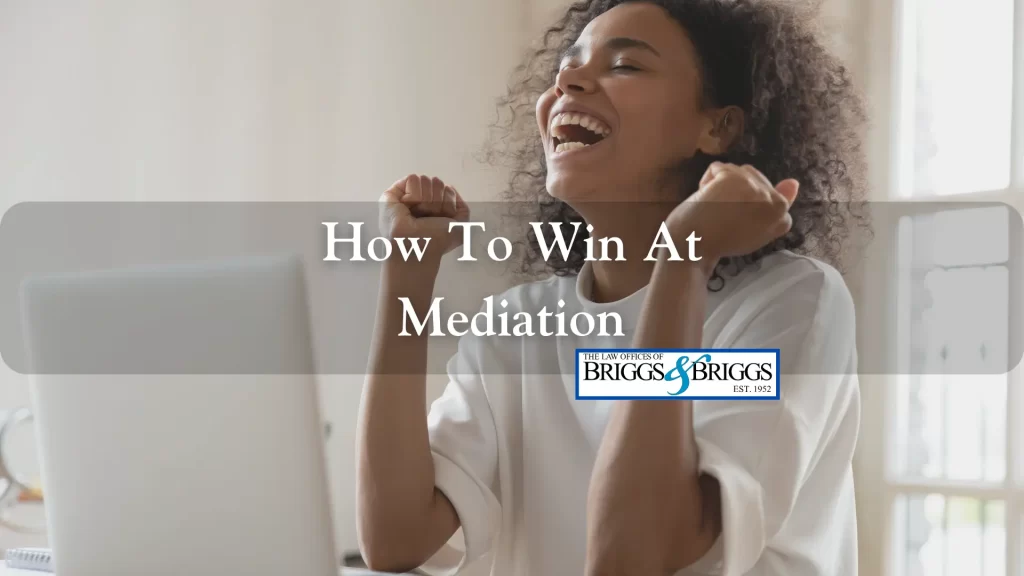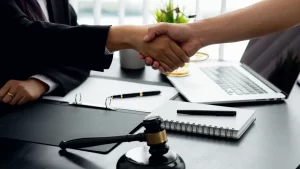Posted on Friday, September 22nd, 2023 at 9:00 am

How do you win at mediation in Washington? The critical thing to keep in mind is that mediation is a process that involves two parties discussing their goals and expectations to reach a mutually beneficial resolution to a personal injury claim. With that said, there are ways you can build a solid claim that improves your chances of reaching your compensation goals during mediation.
The power of mediation is that it offers you a faster claim resolution option without the anxiety and stress of taking your case to trial before a judge. With the help of a neutral third party, you and the other party can effectively communicate your concerns and expectations to arrive at a mutually beneficial settlement arrangement.
At The Law Offices of Briggs & Briggs, we want to provide you with some helpful mediation strategies to recover the compensation you deserve.
The Mediation Process Explained
The role of a mediator during the mediation process is to facilitate productive conversations between the parties and work toward an agreeable resolution to a claim. A mediator should be a neutral, third-party individual with no links to either party involved in the mediation process. Many mediators are former judges or private attorneys.
The process can begin once a mediator is selected, and a mediation date is in place. In a mediation session, the mediator lays out the ground rules for the process. They also introduce both parties. Each side must sign a confidentiality agreement before engaging in mediation because the process is confidential and private, unlike court cases. Court cases are public.
Once introductions occur and each side understands the rules of the process, both parties can present their opening statements and lay out their case. Once each side introduces the merits of their argument, the mediator can choose to conduct joint or private discussions. In joint discussions, both sides are present and can discuss their goals and concerns with each other while the mediator facilitates progressive discussions. In private discussions, the mediator speaks to each party separately and moves back and forth, communicating each side’s issues with the other.
Mediation aims to engage in meaningful dialogue and reach a mutually agreeable settlement for both parties.
Key Strategies to “Win” at Mediation
Getting the most out of mediation involves preparation. You must be thoroughly invested in the process by gathering crucial evidence and outlining the strengths of your claim. Some of the evidence you and your attorney may need to collect to build a solid claim establishing why you deserve fair compensation for your injuries can include:
- Police reports
- Medical records
- Photographs
- Videos
- Witness statements
Working with a knowledgeable attorney makes collecting and preserving vital evidence much more manageable than attempting to gather evidence on your own.
Part of mediation is recognizing that there are two sides to every situation. Discussing your situation with the other party can humanize you to the other side and vice versa. Everyone gets the opportunity to communicate and put faces with names. No one feels like a case number of a nameless entity. Humanizing yourself as the injured party and understanding where the other side is coming from can go a long way toward building rapport and reaching a mutually agreeable settlement.
Negotiating a successful mediation outcome can also come down to how you and your attorney leverage the mediator’s neutrality to bridge gaps between what you want and what the other side wants. You need to show the mediator the strengths of your claim so they can help the other side see the merits of your position, putting you in a stronger place to negotiate to achieve a fair settlement.
The Importance of Timing in Mediation
Sometimes, timing is everything. Although an impending trial may feel overwhelming, setting a trial date before the mediation process may be positive. Having a trial date set before mediation can motivate the other party to negotiate during mediation. You may not want to go to trial, but typically, the other party doesn’t want to spend the time and money to go to trial either. Obtaining a trial date sets the tone and can make the other side more willing to negotiate a meaningful settlement.
Effective Communication: Making a Strong Opening Statement
 Nothing makes a stronger statement than a first impression. That is your opening statement: the first impression you give to the mediator and the other party. You want this statement to stand out and outline the strengths and merits of your claim. It sets up the rest of the mediation session and can enhance your success or produce a lackluster outcome.
Nothing makes a stronger statement than a first impression. That is your opening statement: the first impression you give to the mediator and the other party. You want this statement to stand out and outline the strengths and merits of your claim. It sets up the rest of the mediation session and can enhance your success or produce a lackluster outcome.
One of the most crucial portions of your opening statement must be presenting key evidence supporting your compensation claim. More than a fancy opening is required. You must back up your statements by highlighting the evidence and arguments that strengthen your claim, compellingly arguing that you deserve fair compensation for your injuries, and telling the other side what that fair compensation is.
Working with a personal injury attorney is essential because an attorney can prepare and present the opening remarks.
Navigating the Mediation Session
You may have plenty of compelling evidence, but dropping an evidence bomb on the mediator and the other side doesn’t always give you the desired effect. Skilled personal injury attorneys know the value of stacking the deck and strategically introducing critical evidence at the right moment. Playing your most substantial hand simultaneously is rarely in your best interest. An attorney can help you tactfully present your case and introduce the right arguments at the right time to maximize their effectiveness.
An attorney is also a steady hand that can help push you forward when your voice needs to be heard and rein you in before emotions get the best of you. Remaining fluid and adaptive in all situations can help you make the most of negotiations with the other party.
The True Meaning of “Winning” at Mediation
“Winning” mediation means you successfully achieved your objectives and recovered the compensation you need to cover your financial losses. Winning is about reaching a fair resolution. Working with a skilled personal injury lawyer from The Law Offices of Briggs & Briggs can help set you up to achieve the most favorable result possible for your claim.
Call our Washington office today at (253) 588-6696 to set up a legal consultation with one of our personal injury mediation lawyers.
Related posts
What Documents Do I Need for My Personal Injury Case?
What You Need to Know About Your Car Accident Claim
